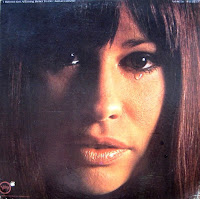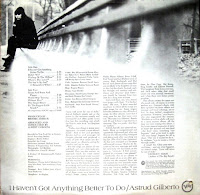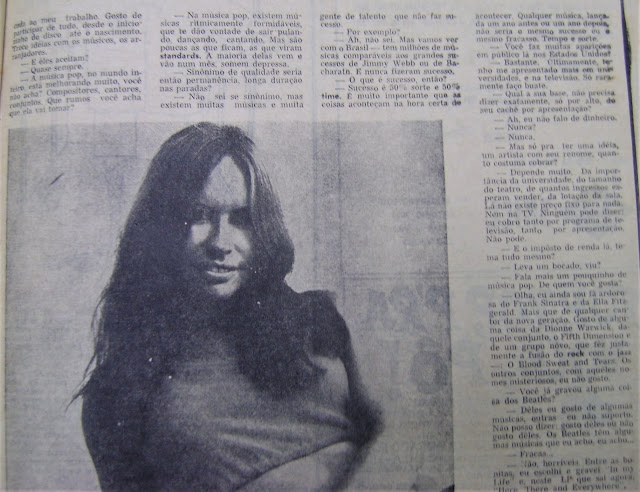João Gilberto nee João Gilberto do Prado Pereira de Oliveira was born on 10 June 1931, in Juazeiro-BA. Astrud and João Gilberto got married in May 1959.
Astrud sings at Teatro Record in São Paulo on Saturday, 25 July 1965. It turned out to be the only time Astrud ever sang in Brazil professionally.
Astrud at her press-conference in Sao Paulo in July 1965; newspaperman Moracy do Val takes notes while radioman Murilo Antunes Alves holds a microphone.
Jorge Amado (best man), João Gilberto, Astrud Weinert and a witness to their wedding.
writer Jorge Amado, singer João Gilberto & Astrud Weinert on their wedding day.
the wedding ceremony took place in Rio de Janeiro in June 1959.
Evangelina, João, Astrud & her father Fritz Weinert.
20 May 1960 - Friday - Astrud Gilberto sings in public for the first time ever - Rio de Janeiro daily 'Ultima Hora' tells it on Tuesday, 23rd May, all about the first Bossa Nova festival organized by college students in Brazil, something that would become common in the next few years until it blossomed into full-on pop-music festivals that had its heyday in 1966-1967 and then die of 'natural causes' in the early 1970s when Brazil lived under a harsh military dictatoship.
'The night of love, smile and flower' - 'A noite do amor, do sorriso e da flor' - the title taken directly from João Gilberto's just released Odeon album 'O amor, o sorrios e a flor' was a trendsetter, a total success! The musical night was organized by the students of Rio de Janeiro's public university Faculdade Nacional de Arquitetura.
The gig lasted for 2 hours with ups and downs provided by Norma Benguel who sang without showing off her famous legs, poet-song-writer Vinicius de Moraes, Elza Soares, Rosana Toledo who was accompanied by Baden Powell, Nara Leão, Os Cariocas, Ronaldo Boscoli, Bebeto, Roberto Menescal, Trio Irakitan, Chico Feitosa, Luiz Paulo, Sergio Ricardo, Claudette Soares and Dori Caymmi. From São Paulo came Johnny Alf, Pedrinho Mattar that conquered all with his piano playing and Caetano Zama with his 'concrete Bossa Nova' (bossa concreta).
To close the night João Gilberto played 'Samba de uma nota só' and 'O pato' where one could hear a pin drop such was the silence and reverence from the audience of 3,000 people that packed the arena-theatre to the rafters. Then João introduced his wife Astrud who sang 'Lamento' and 'Brigas nunca mais' both songs written by Antonio Carlos Jobim. The audience was warm towards Mrs. Gilberto who then left the stage and João closed the night with 'Meditação' written by Jobim & Newton Mendonça from which the title of the night was taken from... 'o amor, o sorriso e a flor...'
'Ultima Hora' 23 May 1960.
Illustrated magazine 'O Cruzeiro' brings a 4-page spread with Astrud Gilberto on 21st August 1965. Astrud was visiting Brazil after a long spell living in the USA & Europe. Brazilian journalists George Torok, Araújo Netto and Carlos Leonam had interviewed Astrud & João in Rome, Italy in early 1963, and had promised they would give the couple copies of the photos they had taken of both at Ambassatori Hotel on Via Veneto. The journos never complied with their promise but now that Astrud was visiting Rio de Janeiro, they honoured their promise giving Astrud the copies of herself, João and their beloved cat Romano, who was now living in New York.
Astrud Gilberto back in Rio de Janeiro in August 1965.
Esta reportagem cumpre uma promessa feita há 2 anos e meio, em Roma, a Astrud e João Gilberto pelos jornalistas que a assinam - George Torok, Araújo Netto e Carlos Leonam. Depois de uma noite de musica, champagne e conversa amena numa luxuosa suite do Ambassatori, um dos grandes hoteis da Via Vittorio Veneto, João e Astrud fizeram um pedido: cópias das fotos daquela noite, como uma recordação do grande rapto. O rapto de um gato que horas antes era a alegria e o companheiro de solidão de uma inglêsa anônima e solteirona.
Na história de João e Astrud, aquele gato, malhado e modesto, sem sangue azul, tinha a mesma importancia dos outros gatos. Porque na história de Astrud sempre houve um gato. Porque na história de João, com Astrud, os gatos também são personagens.
Muito antes de ser a internacional 'Garota de Ipanema', hoje de volta ao Rio, quando ela era a menina baiana, os gatos sempre foram um brinquedo da sua infância.
Ao conhecer Astrud, João Gilberto já era o vitorioso e popular 'Desafinado', o cantor que dera ao velho samba uma nova dimensão. Mas o homem que ainda não aprendera a conhecer e a estimar os gatos. João era um rapaz tímido, de poucos e fiéis amigos, conquistados pela sua voz mansa e pela música do violão. Um sujeito que só apaixonado poderia encontrar tempo e prazer para os gatos, nos intervalos pela sua luta pela perfeição.
Essa reportagem é também a lembrança de um momento feliz e alegre onde o gato, malhado, talvez seja um pretexto. É ainda a homenagem a dois artistas a um só tempo, premiados e separados pelo sucesso.
Romano, o gato, hoje mora em New York, com uma amiga de Astrud e João. Ela já voltou. Ele virá em setembro de 1965. A promessa dos repórteres cumpre-se com o re-encontro do homem, da mulher e do gato.
Astrud Gilberto está de volta. A moça que os reporteres re-encontraram no Rio, querendo as fotos prometidas, é, entretanto, muito diferente daquela outra de Roma. Uma moça que sabe o que quer, que sabe para onde vai, mas que não sabe, ainda, o que vai obter, angustiada pela véspera de uma autêntica estreia. A cantora de fama internacional, que fez e faz sucesso em casa alheia, não sabe, agora, antes da estreia, se fará sucesso em sua própria casa. A mulher bonita, que impôs ao mundo um estilo novo de cantar, receia, tímida e insegura, a confirmação de sua glória popular, mesmo sabendo que, apesar de tudo, ela continuará sendo figura permanente do Hit Parade dos EEUU e da Europa. O Book of the Year, da Enciclopedia Britanica, ao perpetuar os grandes fatos do ano de 1964, assinalou que a nossa 'Garota de Ipanema' foi a grande sensação da musica popular mundial, ao vencer frenéticos cantores de rock'n'roll.
A Astrud de hoje não é mais, como em Roma, Paris, Londres e New York, há dois anos e meio, a simples e juvenil companheira de João Gilberto, o famoso 'rei da Bossa Nova' que os italianos como Michelangelo Antonioni iam cumprimentar nos bastidores do Forum Itálico e que também derrotava os 'urlatori' da musica popular de então.
Desde que gravou com Stan Getz, a vida de Astrud mudou. Raramente consegue passar uma semana em uma cidade. Não mais de três dias num hotel. Ela própria admite: 'Sei que mudei. Mas sinceramente não me apercebi da mudança. Veio como o primeiro fio de cabelo branco que a gente nunca sabe exatamente quando e porque nasceu'.
A vida de João também mudou muito. Hoje ele é só um bom amigo de Astrud. Como ela, João continua famoso e ganhando muito dolar. Em New York, é um imigrante ilustre, de posição definida e renda certa. Continua lutando pela perfeição. Sempre insatisfeito pelo que já alcançou e com o que está fazendo. Em setembro, depois de 3 anos de ausência, ele promete uma viagem ao Brasil, uma visita aliás que tem sido muito prometida e muito adiada. Mas que desta vez parece certa. João deve vir, mesmo, em outra companhia, que não a de Astrud. E também sem o gato Romano.
O gato, quando João e Astrud se separaram, ficou com a moça, mas não pôde permanecer com ela. Estranhou a nova vida de sua amiga. As viagens aéreas fizeram dele um neurótico. Como todo gato que se preza, Romano é um bicho caseiro. Astrud, agora, raramente tem tempo de brincar com ele.
Quando Astrud saiu do Brasil, ela era realmente uma garôta de Ipanema: morava lá, tinha amigos certos no bairro, frequentava as suas praias, sem qualquer compromisso com a fama. Uma garota despreocupada. Voltando ao Brasil, para rever a familia e cumprir um contrato na televisão, Astrud só é 'Garota de Ipanema' em mais de 1 milhão de discos vendidos no mundo inteiro; na musica de Tom Jobim e Vinicius de Morais.
MGM's 'Get yourself a college girl' was released on 18 December 1964, in the USA. Astrud had arrived with a vengeance... among the British set like Dave Clark Five and The Animals...
Summer 1965 in London...
Austrud with Stan Getz in the background...
'Getz au go go' - The New Stan Getz Quartet - featuring Astrud Gilberto - 1964. 1. 'Corcovado' (Quiet night of quiet stars); 2. 'It might as well be spring'; 3. 'Você e eu'; 4. 'Summertime'; 5. '6-nix-pix-clix'; 6. 'Only trust your heart'; 7. 'The singing song'; 8. 'The telephone song' (Telefone); 9. 'One note samba'; 10. 'Here's that rainy day'.
'The Astrud Gilberto Album' - her first LP for Verve Records - 1965; 1. 'Once I loved'; 2. 'Agua de beber'; 3. 'Meditation'; 4. 'And roses and roses' (Das rosas); 5. 'O morro não tem vez'; 6. 'How insensitive' (Insensatez); 7. 'Dindi'; 8. 'Photograph'; 9. 'Dreamer'; 10. 'Só tinha de ser com você'; 11. 'All that's left is to say goodbye'.

'The shadow of your smile' - 2nd album - 1965; it contained: 1. 'Love theme from 'The Sandpipers'; 2.'Take me to Aruanda'; 3. 'Manhã de carnaval'; 4.'Fly me to the moon'; 5. 'The gentle rain'; 6. 'Non-stop to Brazil' (Luiz Bofá); 7. 'O ganso'; 8. 'Who can I turn to?'; 9. 'Day by day'; 10. 'Tristeza'; 11. 'Funny world'.
'The shadow of your smile' b/w 'O ganso' - 45 rpm.
Astrud Gilberto-Walter Wanderley - A certain smile - A certain sadness - her 3rd album - 1966; 1. 'A certain smile'; 2. 'A certain sadness' (C.Lyra); 3. 'Nega'; 4. 'So nice' (Summer samba); 5. 'Você já foi a Bahia?'; 6. 'Portuguese washerwoman'; 7. 'That sadness' (Tristeza); 8. 'Call me'; 9. 'Here's that rainy day'; 10. 'Tu, meu delirio'; 11. 'It's a lovely day today'.

'Look to the rainbow' - Astrud's 4th solo album - 1966; 1. 'Berimbau'; 2. 'Once upon a summertime'; 3. 'A felicidade'; 4. 'I will wait for you' Love theme from 'Umbrellas of Chesbourg'; 5. 'Frevo'; 6. 'Maria Quiet' (Maria Moita); 7. 'Look to the rainbow'; 8. 'Bim bom'; 9. 'Pretty place' (Lugar bonito); 10. 'Eu preciso aprender a ser só' (Learn to live alone); 11. 'She's a carioca' (Ela é carioca).
'Beach samba' - 5th album - 1967; 1. 'Stay'; 2. 'Misty roses'; 3. 'The face I love'; 4. 'Parade' (A banda); 5. 'Oba oba'; 6. 'Canoeiro'; 7. 'I had the craziest dream'; 8. 'Beach samba' (Bossa Nova na praia); 9. 'My foolish heart'; 10. 'Dia das rosas' (I think of you); 11. 'You didn't have to be so nice'; 12. 'Não bate o coração'. It was arranged by Eumir Deodato.
'Windy' - 6th album - 1968; 1. 'Dreamy'; 2. Chup chup, I got away; 3. 'Never my love'; 4. 'Lonely afternoon'; 5. 'On my mind'; 6. 'The bare necessities'; 7. 'Windy'; 8. 'Sing me a rainbow'; 9. 'In my life'; 10. 'Crickets sing for Ana Maria'; 11. 'Where are they now?'.
'I haven't got anything better to do' - 7th album - 1969; 1. 'I haven't got anything better to do'; 2. 'Didn't we?'; 3. 'Wailing of the willow'; 4. 'Where's the love'; 5. 'The sea is my soil (I remember when)'; 6. 'Trains and boats and planes'; 7. 'World stop turning'; 8. 'Without him'; 9. 'Wee small hours'; 10. 'If (the biggest little word)'.
Billboard Verve ad 'A time for us', 28 June 1969.
'Tema de amor de Romeu e Julieta' - 'A time for us' charted well in Brazil. It was Astrud Gilberto's only hit in her own country.
Astrud talks to José Marcio Penido in Cannes, France, for 'O Pasquim', 12 February 1970.Astrud's inteview for 'O Pasquim' in early 1970, where she talks about how she lives her life in Philadelphia sharing a house with a swimming pool with her husband Nick La Sorsa, their son Gregory who was only one-and-a-half years old (born in mid-1968) and Marcelo, João Gilberto's son who was 9 years old.
- 'Seus planos para 1970?'
- 'Bem, o disco já está pronto. Daqui de Cannes vou para a Espanha, Portugal, talvez Holanda e possívelmente Suécia, ainda não está certo. Volto p'ra casa, descanso uns dias e faço um mês no Rainbow Grill, uma boite de New York, vou ao Japão, volto aos Estados Unidos de novo, depois desço até o Mexico e faço uma excursão pela America Latina.
- 'E aí? Volta ao Brasil?'
- 'Se Deus quiser.'
José Marcio Penido, de Paris, via Varig. Foto: Manchete Press. 'O Pasquim', 12 February 1970.
Astrud Gilberto in 1972; Gregory was 4 years old and Marcelo 12.
Astrud in 1972, with her husband Nick La Sorsa, and sons Gregory (4) and Marcelo (12).
Astrud with Brazilian drummer Dom Um and husband Nick La Sorsa in Times Square in 1976.
Astrud talks to Manchete, 23rd October 1976; she had a new show in town in which Dom Um played the first part. João Marcelo was already 15 years old.























































.PNG)
.PNG)

.jpg)





















